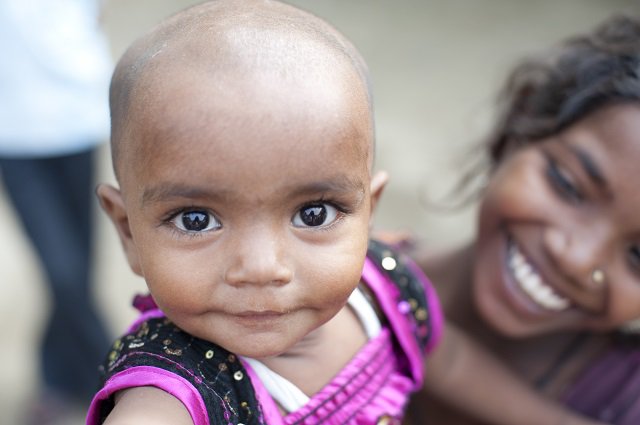India-made rotavirus vaccine achieves World Health Organization prequalification
ROTAVAC® will now be available for procurement by United Nations agencies and Gavi, the Vaccine Alliance, for use in low-resource countries
Media contact: Kate Davidson | media@path.org

Photo: PATH/Gabe Bienczycki
New Delhi, January 24, 2018—PATH applauds Indian vaccine manufacturer Bharat Biotech for receiving prequalification from the World Health Organization (WHO) for their oral rotavirus vaccine, ROTAVAC. As a partner in the development of ROTAVAC, PATH worked with the Indian Department of Biotechnology, the Society for Applied Studies, and Bharat Biotech on the clinical trials that demonstrated the safety and efficacy of the vaccine.
"PATH enthusiastically welcomes Bharat Biotech's news about reaching this exciting and important milestone for ROTAVAC. As a longstanding partner in the development of the vaccine since 2001, we know that achieving WHO prequalification of ROTAVAC brings us even closer to meeting the critical public health goal of improving the supply of affordable rotavirus vaccines worldwide," said Dr. Fred Cassels, global head of Enteric and Diarrheal Diseases at PATH's Center for Vaccine Innovation and Access.
Rotavirus is the most common cause of severe diarrheal disease in children worldwide, and vaccination is the best way to prevent severe rotavirus illness. According to a recent study, 37 percent of the 578,000 childhood diarrheal deaths in 2013 were due to rotavirus, for a total of 215,000 rotavirus deaths globally. More than 90 percent of these deaths occurred in low-resource countries.
ROTAVAC was licensed by the Drugs Controller General of India in early 2014. India began a phased introduction of the vaccine in its national immunization program starting in 2016, and Bharat Biotech has supplied approximately 30 million doses of ROTAVAC to the Indian government to date. Bharat Biotech is committed to providing ROTAVAC at an affordable price to public-sector markets globally to ensure that the vaccine is accessible to all children in low-resource settings.
A collaborative vaccine development pathway
ROTAVAC (also known as 116E) was developed through a unique social innovation partnership that brought together the experience and expertise of Indian and international researchers as well as the public and private sectors. The vaccine originated in India from an attenuated (weakened) strain of rotavirus that was isolated from an Indian child at the All India Institute of Medical Sciences in New Delhi in 1985-86. Since then, partners have included the Government of India's Department of Biotechnology, Society for Applied Studies, Bharat Biotech, the US National Institutes of Health, the US Centers for Disease Control and Prevention, Stanford University School of Medicine, and PATH. The vaccine development partnership was supported by the Department of Biotechnology, the Bill & Melinda Gates Foundation, the Research Council of Norway, and the UK Department for International Development. Bharat Biotech invested important technical, manufacturing, and financial resources toward vaccine development.
More information: